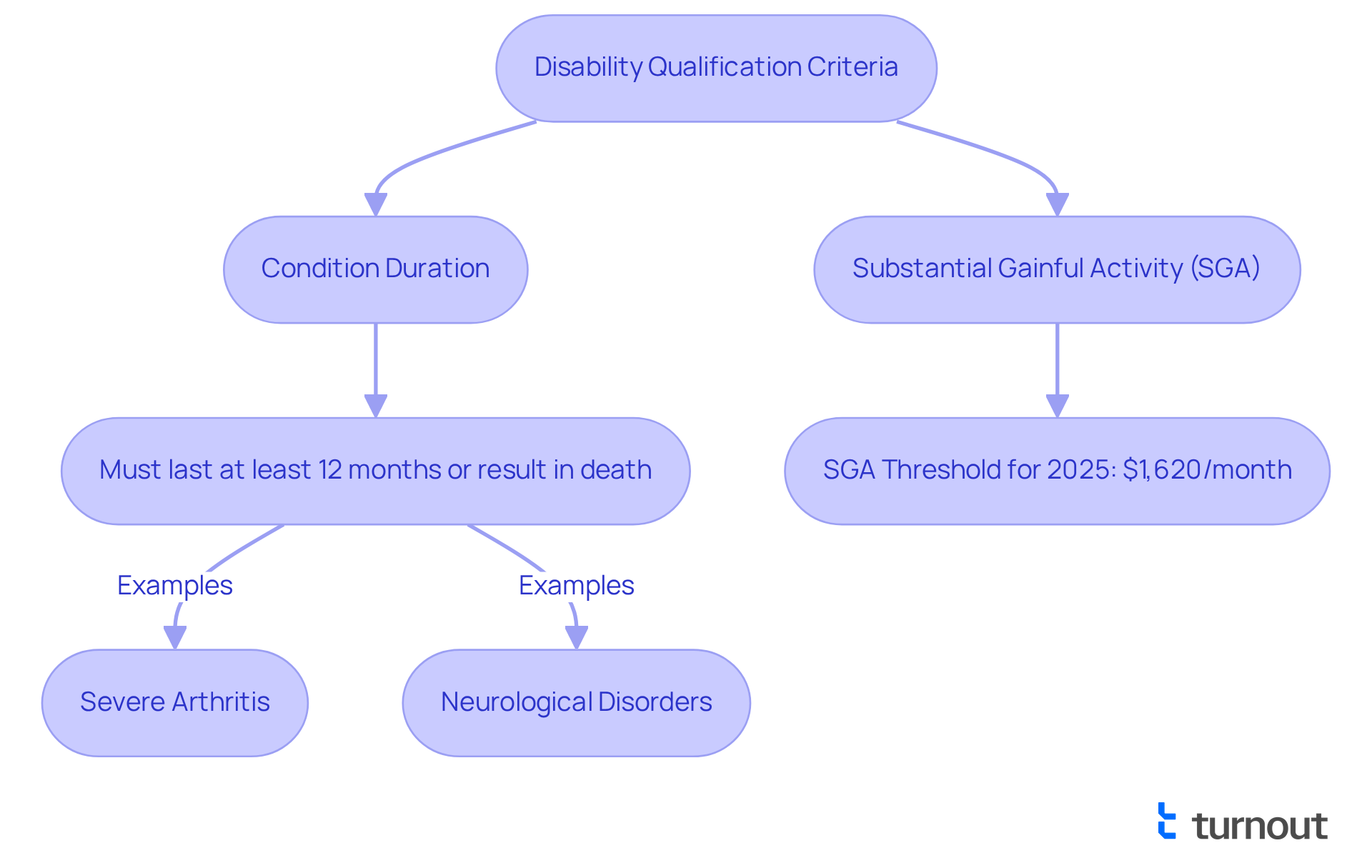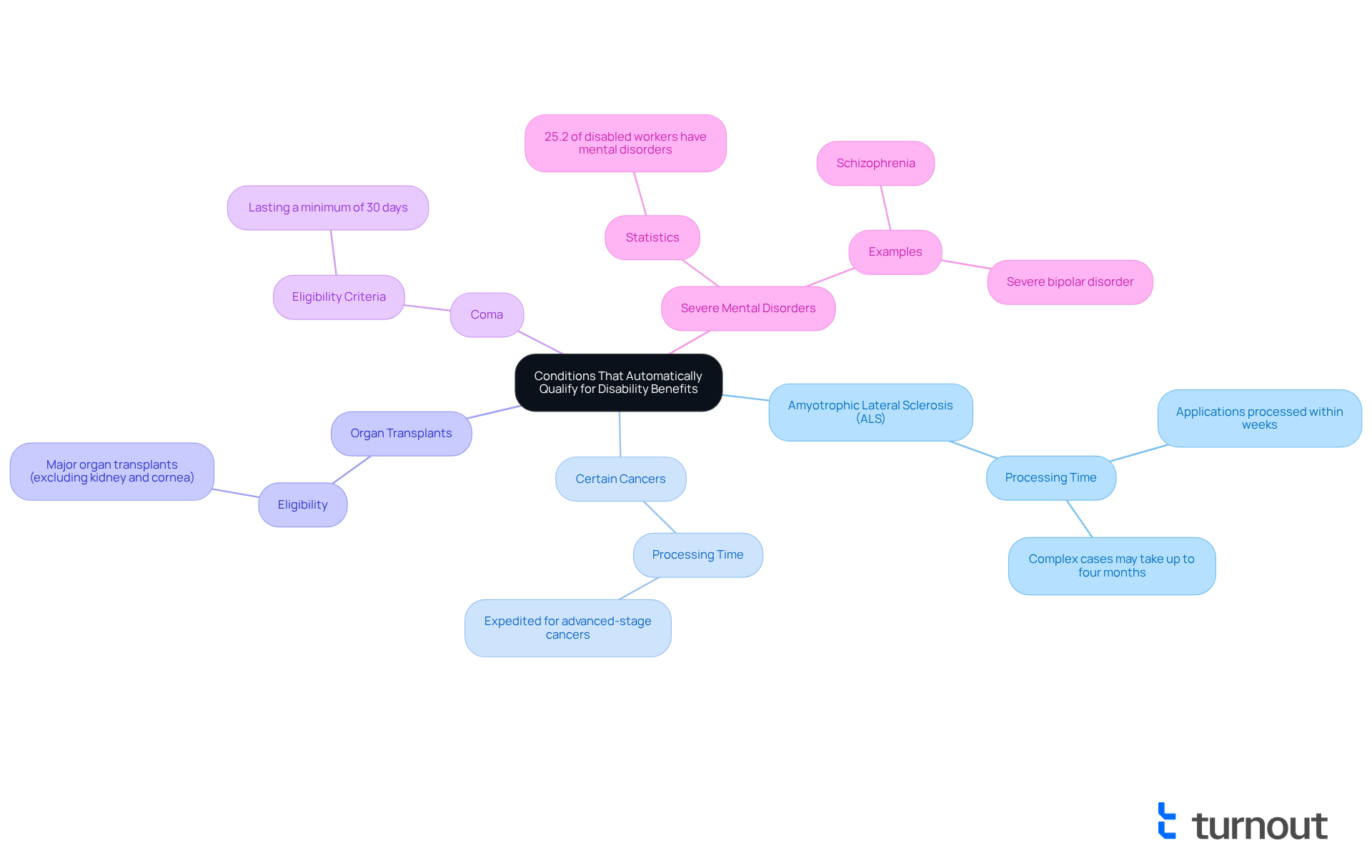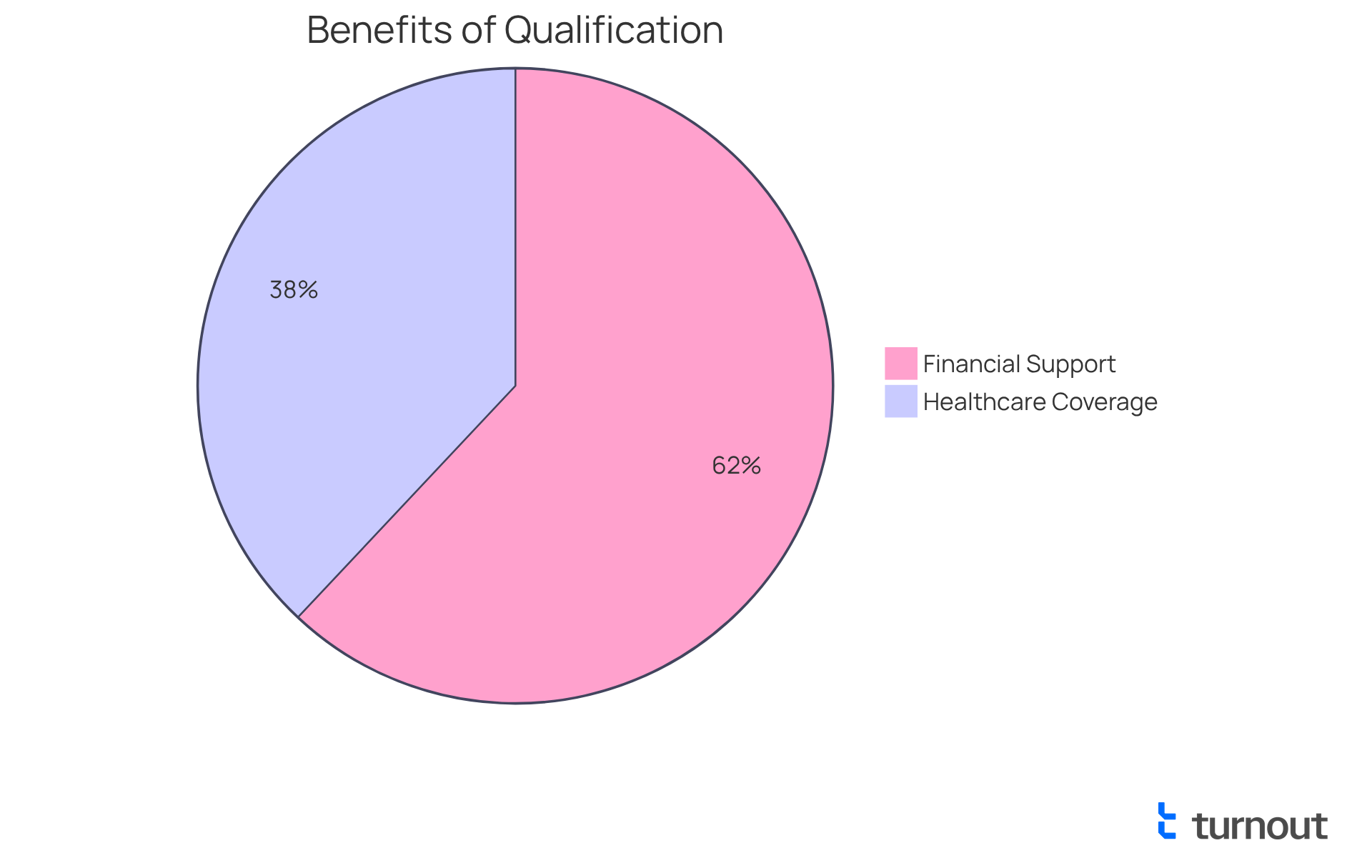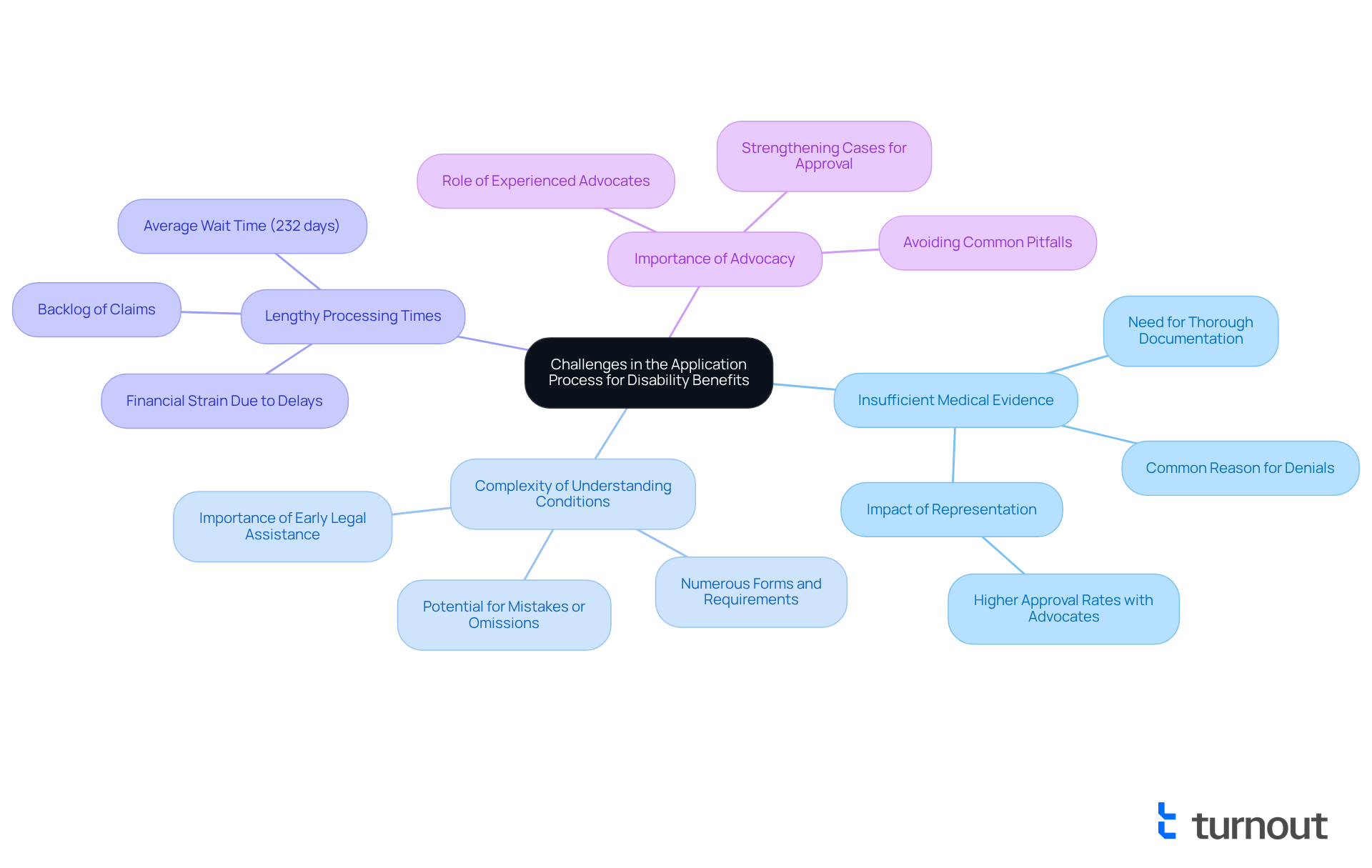Overview
We understand that navigating the world of disability benefits can be overwhelming, especially when faced with severe health challenges. Certain conditions, such as:
- Severe neurological disorders like ALS
- Advanced-stage cancers
- Major organ transplants
can automatically qualify individuals for support. These conditions significantly impair one's ability to work, and it's crucial to recognize that help is available.
Understanding these qualifying conditions and the associated application process can truly expedite access to vital financial and healthcare support. Programs like Compassionate Allowances are designed to prioritize urgent medical needs, ensuring that those who need assistance the most can receive it promptly.
Remember, you are not alone in this journey. We're here to help you navigate these important steps toward securing the support you deserve.
Introduction
Understanding the complexities of disability benefits can feel overwhelming, especially when determining eligibility. We understand that navigating this process is challenging. The Social Security Administration (SSA) outlines specific conditions that can automatically qualify individuals for assistance. Yet, many remain unaware of these critical criteria.
What if knowing these conditions could not only simplify the application process but also provide essential financial support during difficult times? As the landscape of disability qualifications evolves, exploring the conditions that guarantee automatic qualification becomes increasingly vital.
We're here to help you find clarity and support in your journey.
Define Disability: Criteria for Automatic Qualification
Disability, as described by the Social Security Administration (SSA), encompasses situations that significantly limit a person's ability to perform essential work-related tasks. We understand that navigating these requirements can feel overwhelming. To determine what conditions automatically qualify you for disability, your condition must be expected to last for at least 12 months or result in death.
Additionally, it's important to understand what conditions automatically qualify you for disability, including the requirement that you must be unable to engage in substantial gainful activity (SGA), which, for 2025, is set at $1,620 per month for non-blind individuals. Exceeding this threshold can disqualify you from receiving benefits, so understanding what conditions automatically qualify you for disability is vital for assessing your eligibility.
In 2025, periodic updates to SSA medical listings may also influence eligibility. Staying informed about any changes is crucial. For instance, individuals often wonder what conditions automatically qualify you for disability, as those with severe arthritis or neurological disorders typically meet the SSA criteria, showcasing the real-world impact of these regulations on lives.
We want you to know that navigating the complexities of qualification for impairments requires a thorough understanding of these definitions and thresholds. Remember, you are not alone in this journey, and we are here to help you every step of the way.

List of Conditions That Automatically Qualify for Disability Benefits
While no situation guarantees automatic eligibility for disability assistance, knowing what conditions automatically qualify you for disability can significantly expedite the approval process through the Social Security Administration's Compassionate Allowances initiative. We understand that navigating this journey can be overwhelming, so it's important to know what conditions automatically qualify you for disability to receive faster assistance.
Key conditions that may qualify include:
- Amyotrophic Lateral Sclerosis (ALS): This progressive neurodegenerative disease affects nerve cells in the brain and spinal cord, often leading to rapid deterioration in physical function. If you or a loved one has been diagnosed with ALS, applications can be processed within several weeks. However, some reviews for Compassionate Allowance applications may take up to four months, depending on the complexity of the case.
- Certain Cancers: Advanced-stage cancers, particularly aggressive forms or those that have metastasized, are recognized for expedited processing. If you are facing this battle, know that support is available.
- Organ Transplants: Individuals who have undergone major organ transplants, excluding kidney and cornea transplants, may also be eligible for assistance.
- Coma: A coma lasting a minimum of 30 days can result in automatic eligibility for support.
- Severe Mental Disorders: Conditions such as schizophrenia or severe bipolar disorder are included in the list of qualifying ailments. It's important to understand what conditions automatically qualify you for disability, as 25.2 percent of currently disabled employees receiving assistance have mental disorders, underscoring the importance of mental health in our support landscape.
The Compassionate Allowances program is designed to simplify the claims process for those with these serious conditions, allowing you to learn what conditions automatically qualify you for disability and helping you access the essential support you need more quickly. For instance, individuals diagnosed with ALS can expect their applications to be handled within a few weeks, demonstrating the program's commitment to addressing urgent medical needs.
However, it's essential to remember that after approval for Compassionate Allowances, individuals must wait five months from the date their disability is acknowledged before receiving their initial payment, with assistance starting in the sixth month. As of 2025, the SSA recognizes over 280 conditions under this program, ensuring that those facing life-threatening or debilitating health issues receive timely support.
A poignant example is the case of Michael Kraft, a Wisconsin resident diagnosed with terminal cancer. Despite having contributed to Social Security for years, he faced delays in obtaining support, highlighting the urgent need for reform in the Social Security system. Remember, you are not alone in this journey, and we’re here to help you navigate these challenges.

Implications of Automatic Qualification: Benefits and Application Process
Meeting the criteria for assistance can profoundly affect your financial security and access to essential healthcare services. We understand that navigating this process can feel overwhelming. Understanding what conditions automatically qualify you for disability not only simplifies the handling of claims but also ensures that you receive the support you need in a timely manner. The benefits of automatic qualification are significant:
- Financial Support: Monthly payments that help cover living expenses and medical costs. In 2025, SSDI beneficiaries are projected to receive average monthly payments of approximately $1,500, while SSI beneficiaries can expect around $943 per month.
- Healthcare Coverage: Eligibility for Medicare or Medicaid, depending on the type of assistance received, which is crucial for managing ongoing medical needs.
The application process typically requires you to provide detailed medical records to the Social Security Administration (SSA) to clarify what conditions automatically qualify you for disability assistance. You may also need to share information about your work history and any previous claims. We recognize that understanding the complexities of this process is vital for overcoming the challenges of securing the support necessary for your financial and health stability. Remember, you are not alone in this journey; we’re here to help you every step of the way.

Challenges in the Application Process for Disability Benefits
Despite the presence of factors that may expedite eligibility for disability assistance, many applicants struggle to understand what conditions automatically qualify you for disability, leading to significant hurdles during the application process. We understand that navigating these challenges can be daunting. Key obstacles include:
- Insufficient Medical Evidence: A common reason for claim denials is the lack of thorough medical documentation. Claims often falter when applicants cannot provide clear proof of the severity of their conditions, making it difficult to determine what conditions automatically qualify you for disability, which is crucial for approval. It's worth noting that understanding what conditions automatically qualify you for disability can significantly impact claimants, as those with representatives receive benefits at a rate three times higher than those without, highlighting the importance of advocacy in overcoming this challenge.
Understanding what conditions automatically qualify you for disability can help simplify the application process, which can often feel overwhelming due to the numerous forms and requirements that may confuse applicants. This complexity can lead to mistakes or omissions, jeopardizing the understanding of what conditions automatically qualify you for disability approval.
Even for those with qualifying conditions, the wait times for decisions can be lengthy, raising questions about what conditions automatically qualify you for disability. As of early 2025, the average processing time for an initial disability decision is around 232 days, with over 1 million initial claims pending as of April 2025. These delays can create financial strain and uncertainty, especially when considering what conditions automatically qualify you for disability.
To navigate these challenges effectively, it is essential for applicants to gather comprehensive medical records and seek support from knowledgeable advocates who can inform them about what conditions automatically qualify you for disability. Engaging with experienced advocates early in the process can significantly enhance your understanding of what conditions automatically qualify you for disability. They can help applicants by explaining what conditions automatically qualify you for disability, allowing them to avoid common pitfalls and bolster their cases. As T.J. Geist, a principal advocate at Allsup, wisely notes, "The SSDI application process can feel overwhelming, especially with the added delays at the SSA. By starting with expert assistance, claimants can avoid common pitfalls, strengthen their cases, and improve their chances of approval on the first try by knowing what conditions automatically qualify you for disability." Remember, you are not alone in this journey; we’re here to help you every step of the way.

Conclusion
Understanding the criteria for automatic qualification for disability benefits is essential for individuals facing significant health challenges. This article has explored the specific conditions recognized by the Social Security Administration (SSA) that can expedite the approval process. Knowing which ailments can lead to timely assistance is crucial in easing the burden during this challenging time.
Key conditions such as:
- Amyotrophic Lateral Sclerosis (ALS)
- Severe cancers
- Serious mental disorders
are automatic qualifiers under the Compassionate Allowances program. We also addressed the financial and healthcare benefits that accompany meeting these criteria. It's common to face challenges in the application process, including the need for thorough medical documentation and the potential for lengthy processing times.
Ultimately, being aware of what conditions automatically qualify you for disability benefits empowers you to navigate the system more effectively. It underscores the necessity of seeking support from knowledgeable advocates. By understanding these criteria and the associated benefits, you can take proactive steps to secure the assistance you need. Remember, you are not alone in this journey; we’re here to help ensure your financial and healthcare needs are met during difficult times.
Frequently Asked Questions
What is the definition of disability according to the Social Security Administration (SSA)?
Disability, as defined by the SSA, includes situations that significantly limit a person's ability to perform essential work-related tasks.
What are the criteria for automatic qualification for disability?
To automatically qualify for disability, your condition must be expected to last for at least 12 months or result in death, and you must be unable to engage in substantial gainful activity (SGA).
What is the SGA threshold for 2025?
For 2025, the SGA threshold is set at $1,620 per month for non-blind individuals. Exceeding this amount can disqualify you from receiving benefits.
How can periodic updates to SSA medical listings affect eligibility?
Periodic updates to SSA medical listings may influence eligibility, so staying informed about any changes is crucial for assessing qualification for disability.
What types of conditions typically meet the SSA criteria for disability?
Conditions such as severe arthritis or neurological disorders often meet the SSA criteria for automatic qualification for disability.
What should individuals do if they feel overwhelmed by the qualification process?
It is important to understand the definitions and thresholds related to disability qualification, and individuals are encouraged to seek assistance as they navigate this complex process.




